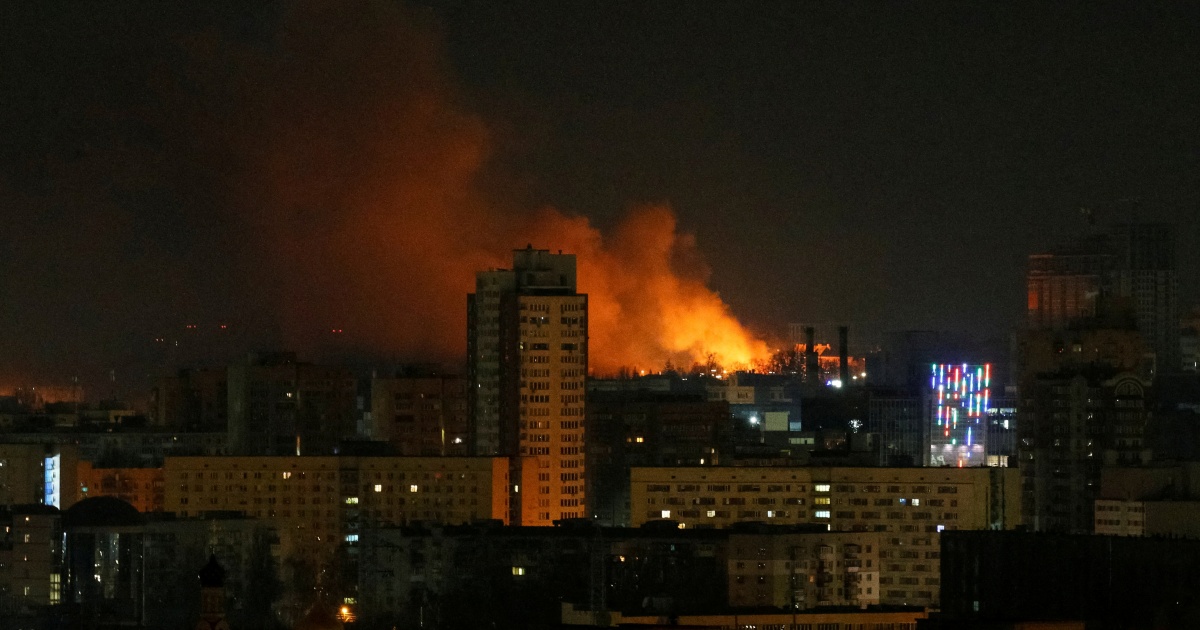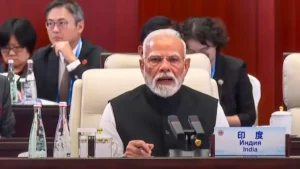Russian invasion of Ukraine enters third day: What we know so far
Reports of artillery blasts heard in Kyiv as Ukrainian President Volodymyr Zelenskyy warns of impending Russian assault on the capital.
Invading Russian forces have closed in on Ukraine’s capital in an apparent encircling movement after a barrage of air attacks on cities and military bases around the country.
Frequent artillery blasts could be heard in Kyiv in the early hours of Saturday, coming from an unspecified location some distance from the city centre, according to the Reuters news agency.
The invasion of Ukraine began early on Thursday with missile attacks on cities and military bases, followed by a multipronged ground assault that rolled troops in from separatist-held areas in the east; from the southern region of Crimea, which Russia annexed in 2014; and from Belarus to the north.
The assault, anticipated for weeks by the West, amounts to Europe’s most significant ground conflict since World War II. It is unclear how much or little Russian forces have seized or the extent of the casualties.
Here is what we know about the conflict so far:
‘This night they will storm’
With growing signs that Russia aims to overthrow him, Ukrainian President Volodymyr Zelenskyy told European Union leaders in a video link-up from his bunker late on Thursday that it might be the last time they saw him alive.
But on Friday, Zelenskyy released a video of himself and his senior aides outside the presidential office in Kyiv to reassure Ukrainians that he and other top officials would stay in the capital.
He later appealed for a ceasefire and warned in a bleak statement of an impending Russian assault in Kyiv and other cities across the country.
“This night they will storm,” he said. “We must withstand tonight.”
Russian troops march on
The Russian military on Friday said it had encircled the cities of Sumy and Konotop in northeastern Ukraine but was “taking steps to ensure civilians’ safety”.
Russian Defence Ministry Spokesman Major General Igor Konashenkov said their forces have so far knocked out 211 Ukrainian military installations, including 17 command centres, 19 air defence missile systems, 39 radar units, 67 tanks and six warplanes.
The Russian military also said it seized a strategic airport outside Kyiv, allowing it to quickly build up forces to take the capital.
Late on Friday, the Russian military said it has taken over Melitopol, a city near the Azov Sea. The claim could not immediately be independently verified.
Ukraine’s military reported shooting down an II-76 Russian transport plane carrying paratroopers near Vasylkiv, a city 40km (25 miles) south of Kyiv. It was unclear how many were on board, but the II-76 is able to carry up to 125 paratroopers.
‘Overall mood one of horrendous fear’
Waking to the second day of Russia’s invasion, horrified civilians found themselves at risk as artillery shells rained down on some residential buildings on Kyiv’s outskirts.
Al Jazeera’s Andrew Simmons, reporting from Kyiv, said the situation there is rapidly “escalating in every respect”.
“That is not just in the air but on the ground as well. There are armoured [Russian] columns heading towards the city,” he said.
Simmons said there is “real anger in the air” and “hatred for Putin is palpable”.
“Furthermore, there are a number of places in the city where people can get a gun of their choice, particularly an AK-47, to defend themselves and that is the policy of the presidency. Zelenskyy wants everyone to fight,” he reported.
“What we are going to find is that when these Russian forces reach the capital, there is likely to be fierce resistance. The overall mood is one of horrendous fear of what’s going to happen next.”
Ravina Shamdasani, a spokeswoman for the UN High Commissioner for Human Rights, said its staffers have so far verified at least 25 civilian deaths and 102 injured, mostly from shelling and air attacks.
A spokeswoman for the UN Refugee Agency, Shabia Mantoo, said more than 100,000 people were believed to have left their homes in Ukraine and that “up to 4 million people may flee to other countries if the situation escalates”.
Thousands of Ukrainians crossed on Friday into neighbouring countries to the west in search of safety from the unfolding war in their country.
Cars were backed up for several kilometres at some border crossings as authorities in Poland, Slovakia, Hungary, Romania and Moldova mobilised to receive the Ukrainians, providing shelter, food and legal help. These countries also eased their usual border procedures, including COVID-19 testing requirements.
Russia vetoes UN resolution on Ukraine attack
Russia vetoed a United Nations Security Council resolution on Friday demanding that Moscow immediately stop its attack on Ukraine and withdraw all troops. The vote was 11 in favour, with Russia voting no and China, India and the United Arab Emirates abstaining.
The United States-drafted resolution’s failure paves the way for supporters to call for a quick vote on a similar resolution in the 193-member UN General Assembly, where there are no vetoes. There was no immediate word on a timetable for an assembly vote.
The UN also plans to seek over $1bn in donations for humanitarian relief in Ukraine over the next three months, the UN humanitarian chief said on Friday. French President Emmanuel Macron said the EU has decided on an “unprecedented” 1.5 billion euros ($1.69bn) in economic aid for Ukraine.
Hints of talks to stop the fighting
Hopes for a negotiated end to the war dimmed on Friday after a tentative agreement to discuss Zelenskyy’s offer to designate Ukraine as a non-aligned country appeared to break down.
The Kremlin initially said it was ready to send a delegation to Belarus but later back-pedalled, saying it preferred to meet in Warsaw. Russian Foreign Minister Sergey Lavrov suggested it was too late, saying Zelenskyy should have agreed to talks earlier.
But late on Friday, Zelenskyy’s spokesman Sergii Nikiforov wrote on Facebook the two sides are consulting on a place and time for the talks.
Hungary’s Foreign Minister Peter Szijjarto offered Budapest as a possible location. Also writing on Facebook, he said he put the proposal to both Russia’s and Ukraine’s governments and neither dismissed it.
But US State Department Spokesperson Ned Price said Russia’s offer was an attempt to conduct diplomacy “at the barrel of a gun” and that President Vladimir Putin’s military must stop bombing Ukraine if it was serious about negotiations.
US President Joe Biden and his NATO partners agreed on Friday to send thousands of troops to help protect allies along the alliance’s eastern edge.
Before the invasion, the West had rejected Russia’s demand to keep Ukraine out of NATO. Putin used the refusal to justify the invasion, claiming that the West left him no other choice.
Pope’s personal appeal for peace
The pope broke protocol with an in-person visit on Friday to the Russian embassy to “express his concern about the war” in Ukraine.
Pope Francis’s extraordinary gesture was viewed as a sign of his anger at Russia’s actions, and his willingness to make a personal appeal for the end of hostilities.
The pope travelled to and from the embassy in a small white car, with Vatican officials saying they knew of no such previous papal initiative.
Sanctions against Russia
The US, United Kingdom, Canada and EU said on Friday they will sanction Putin and his foreign minister, Sergey Lavrov. The EU unanimously agreed to freeze their assets.
EU ministers have said that even further sanctions were still possible, including booting Russia out of SWIFT, the dominant system for global financial transactions.
Russian Foreign Ministry Spokesperson Maria Zakharova said the sanctions showed the “total helplessness” of the West. “Who are you going to talk to? … A nuclear power, a great country; who have you decided to play with?” Zakharova said in televised remarks.
In retaliation to a British ban on Aeroflot flights, Russia’s civil aviation authority forbade UK flights to and over Russia starting Friday.
Sporting world turns its back
Russia has been stripped of hosting the Champions League final by UEFA, with St Petersburg replaced by Paris, and Formula One has dropped this season’s Russian Grand Prix in Sochi in September.
The showpiece final in the European men’s football season will still be held on May 28 but at the 80,000-seat Stade de France.
The International Ski Federation announced Russia will not host any more of its World Cup events this season.
The European curling championships scheduled to be held in November in Perm, Russia, will also be relocated, the sport’s international governing body announced on Friday.
The International Tennis Federation also cancelled all events taking place in Russia indefinitely.









